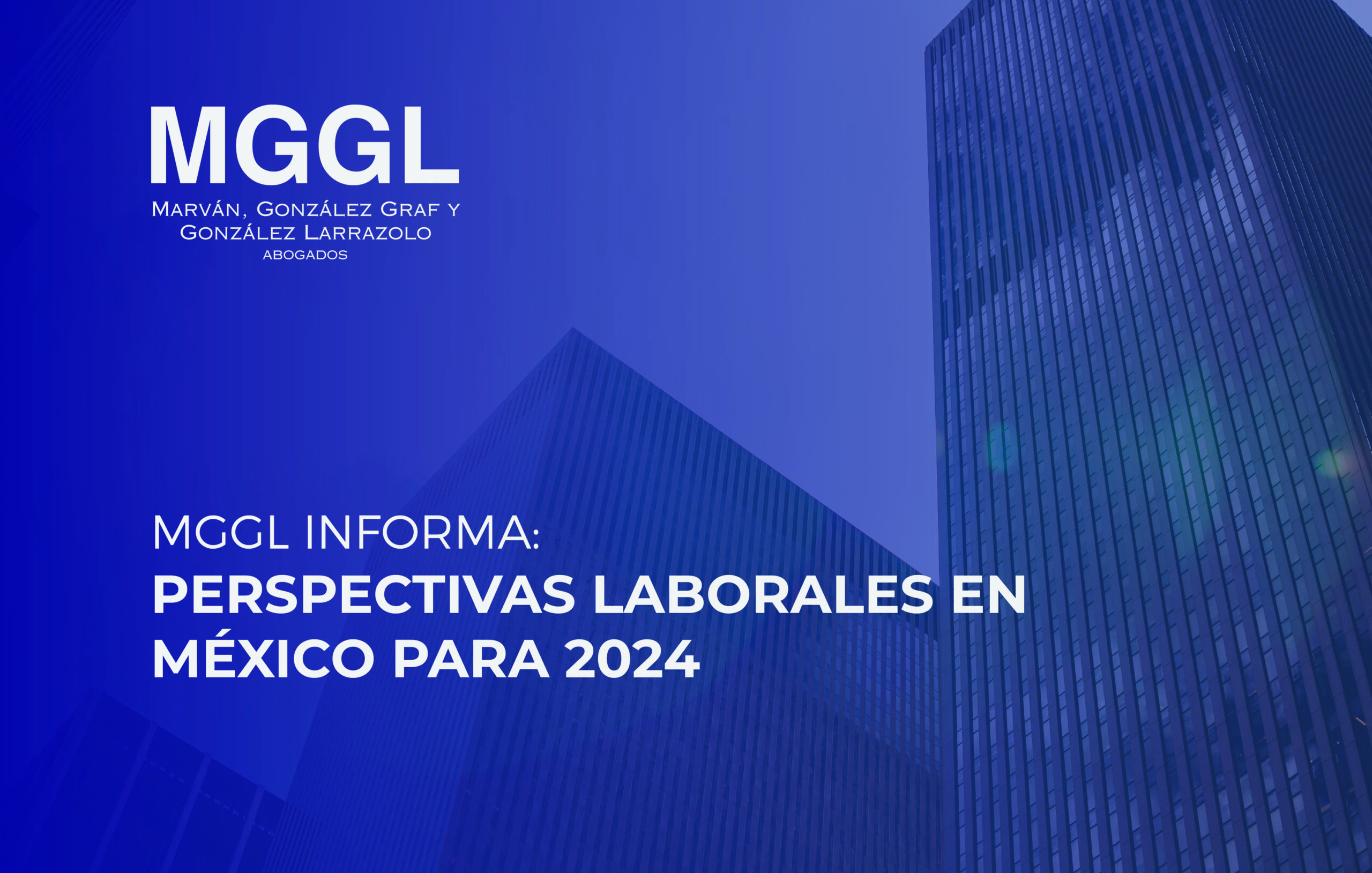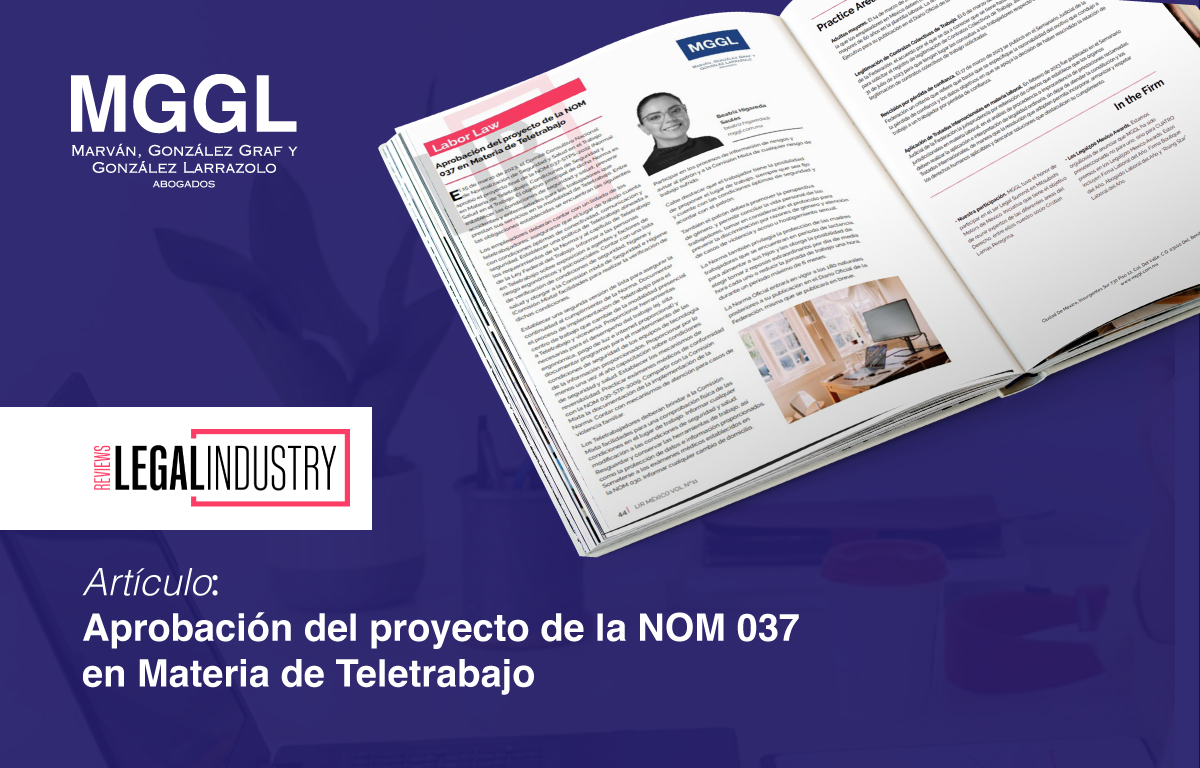During the first quarter of the year, several reforms to labor legislation were published, among other provisions in the field, reigniting legislative debate on various initiatives planned for implementation. In this newsletter, we share with you relevant legislative updates, legal criteria, and pending initiatives.
Continue readingFLEXIBILIDAD DEL PROCEDIMIENTO DEL DESPIDO
Nos complace compartir el artículo, escrito por nuestro socio Santiago Marván Urquiza, recientemente publicado en la 16ª Edición de The Legal Industry Reviews (Febrero 2025).
La Segunda Sala de la Suprema Corte de Justicia ha confirmado la validez de la reforma al artículo 47 de la Ley Federal del Trabajo (LFT), estableciendo que la falta de entrega del aviso de despido solo genera una presunción de despido injustificado, pero permite que el patrón pueda demostrar lo contrario.
Históricamente, la LFT exigía a los empleadores entregar un aviso escrito a los trabajadores despedidos, y su omisión implicaba que el despido se considerara injustificado. Sin embargo, con la reforma de 2019 y la reciente resolución de la Suprema Corte, se flexibiliza el proceso para los patrones, permitiéndoles justificar el despido en juicio aún sin haber entregado el aviso por escrito.
¿Qué significa esto?
- Los empleadores pueden probar en juicio las razones del despido, incluso sin el aviso escrito.
- Se elimina la consecuencia automática de considerar injustificado un despido solo por la falta de notificación.
- Se otorga mayor margen de defensa a los patrones en casos de litigios laborales.
Ésta decisión impacta directamente en las relaciones laborales y en la manera en que se gestionan los despidos en México. ¿Cómo afectará esto a trabajadores y empleadores? ¡Descúbrelo en el artículo completo!
MINIMUM WAGE INCREASE FOR 2025 AND APPROVAL OF THE "CHAIR LAW" (“LEY SILLA”)
Minimum Wage. On December 4th, it was announced that the minimum wage increase for 2025 will be 12%. Starting January 1st, 2025, the general minimum wage will be $278.80 MXN per day, and $419.88 MXN per day for the Free Zone of the Northern Border ("ZLFN").
The increase in the general minimum wage was calculated by applying a 6% increase to the amount resulting from the sum of the current 2024 minimum wage plus the "Independent Recovery Amount" ("MIR"). The MIR is a fixed amount established as part of the government’s policy to recover the purchasing power of the minimum wage and should not be used as a reference for setting other wages, such as contractual ones.
The 12% increase also applies to professional minimum wages, which cover a total of 61 professions, trades, and occupations.
En los últimos años, el salario mínimo se ha incrementado en mayor medida en comparación con años anteriores, por lo que este último incremento fue reservado:

These increases are intended to make progress toward the goal that by 2030, every worker will be able to afford 2.5 times the cost of the basic basket of goods.
On the international level, since 2023, Mexico has surpassed the average of general minimum wages in Latin America, and the increase for 2025 could be the largest in the region for that year. This decision is important for maintaining the positioning and competitiveness of wages in the country.

Chair Law. On December 4th, the Mexican Senate approved a legislative initiative with a decree project to amend various articles of the Federal Labor Law regarding the right to rest during the workday (known as the “Chair Law”). This marks the end of the legislative process in the Congress of the Union, with publication in the Official Journal of the Federation ("DOF") still pending.
Con esta reforma se reconoce y protege el derecho de los trabajadores al descanso en un asiento con respaldo durante la jornada laboral, reafirmando la prohibición a los patrones de obligar a sus trabajadores a permanecer de pie durante su jornada de trabajo y prohibir que tomen asiento periódico durante la jornada, generando la obligación a los patrones de proveer número suficiente de asientos o sillas con respaldo para todos sus empleados trabajadores en sectores de servicios, comercio y centros de trabajo análogos para la ejecución de sus funciones o para el descanso periódico durante la jornada de trabajo.
In cases where it is not possible to provide seating due to the nature of the work, designated areas should be set up for this purpose, with rest periods for their use.
The new provisions are expected to become mandatory by mid-2025. Before this deadline, the Ministry of Labor must issue the corresponding Norms (NOMs) to define and specify the conditions under which chairs and seats must be provided, as well as the specific obligations arising from this regulation.
REFORM TO PREVENT LABOR EXPLOITATION
On June 8, a reform to the General Law to Prevent, Punish and Eradicate Crimes in Connection With Human Trafficking and for the Protection and Assistance to Victims went into effect, as of which working hours that exceed, on a permanent basis, the limits established in the Federal Labor Law will be considered as labor exploitation and may be sanctioned with imprisonment and fines.
Continue readingMEXICO'S LABOR OUTLOOK FOR 2024
The legislative transformation resulting from the TMEC negotiations, the impact of the minimum wage increase, collective bargaining, and the labor legislative agenda for 2024.
Continue readingESTABILIDAD EN EL EMPLEO
Nos complace compartir el artículo, escrito por nuestro socio J. Genaro Pérez Velázquez, recientemente publicado en la 12ª Edición de The Legal Industry Reviews (Julio 2023).
El derecho laboral en México siempre ha defendido el principio de la estabilidad en el empleo. Pero, con las recientes reformas, estamos presenciando cambios considerables en este principio:
- Antes, la Ley Federal del Trabajo (LFT) consideraba la estabilidad en el empleo como un derecho fundamental. Sin embargo, con las reformas, ha habido un cambio en su percepción.
- Si un trabajador es despedido injustamente, puede solicitar la reinstalación. Pero hay excepciones según el artículo 49 de la LFT.
- En caso de eximición, el patrón debe pagar indemnizaciones detalladas en el artículo 50 de la LFT.
- Con la reforma de 2019, ahora los patrones pueden depositar las indemnizaciones en el Tribunal paraprocesalmente, aportando información esencial del trabajador.
- Si hay desacuerdo sobre la indemnización, el trabajador puede tomar medidas legales. Si el Tribunal decide que no se cumplen los criterios para la eximición, el depósito de la indemnización queda sin efecto.
- Si el monto depositado es insuficiente, el Tribunal obligará al patrón a pagar el saldo restante e intereses.
Las reformas buscan agilizar los procesos y reducir tiempos y costos, pero es esencial estar bien informado. Conozca más detalles en nuestro artículo completo y manténgase actualizado en este ámbito tan crucial.
OFFICIAL MEXICAN STANDARD NOM-037-STPS-2023 REGULATING TELEWORKING ISSUED
On June 8, the Official Mexican Standard NOM- 037-STPS-2023, Teleworking-Conditions for Safety and Health at Work ("NOM-037"), issued by the Mexican Ministry of Labor and Social Welfare, was published in the Official Gazette. This official standard will become effective 180 calendar days after its publication, that is, as of December 5, 2023.
NOM-037 will be mandatory for those who hire people under the Telework modality. The definition of Telework is in line with the Federal Labor Law, being understood as a form of labor organization consisting in the performance of activities in places other than the work center –so that the physical presence of the employee is not required– using information and communication technologies for supervision and contact with the employer. It should be noted that NOM-037 provides that a specific address must be established for this modality to be effective. This implies that people will not be able to render services from places such as cafeterias or restaurants and, in case they decide to relocate, the company must validate the conditions of each new address.
Another relevant point is that it defines the right to disconnection. In this regard, NOM-037 establishes that it refers to the right of employees to disconnect from work (including disconnection from any technology) and refrain from participating in any type of communication with the workplace at the end of the workday, as well as during non-working hours, vacations, holidays, leaves of absence and during breaks agreed between the parties.
NOM-037 addresses the safety and health conditions in the places where teleworkers perform their activities, to prevent accidents and diseases, as well as to promote a safe and healthy work environment. In this regard, companies that decide to implement the Telework modality should assume the following obligations:
- Implement, publish, and maintain a Telework Policy. This policy should contain, among others, the terms to perform Telework in a safe and healthy way, in addition to indicating the mechanisms and rules of contact between the company and the employees. It should also define the mechanisms in case it is necessary to return to a commuting modality, even if it will be temporary.
- Have a checklist of safety and health conditions in Telework. This is a tool to assess whether the place for Teleworking has safe and healthy conditions. This checklist seeks to evaluate the suitability of candidates to perform under this modality, as well as the physical space proposed to perform the work, considering ergonomic risk factors, lighting, ventilation, and noise, among others. Companies must have evidence that they validated the conditions indicated in the list, either through a visit to the proposed site, or by allowing the candidate to fill out the list to be subsequently reviewed by the Company. In both cases, photographic or video evidence should be generated. Companies should also implement periodic checks and document them in new follow-up lists.
- Have an updated list of people who perform Telework. This list must contain, among other elements, the activities to be performed, their job profile, the percentage of time they will be teleworking, as well as the computer equipment and furniture that is granted by the company, if applicable. Regarding the last point, NOM-037 endorses the obligations of the Federal Labor Law in connection with the provision of a computer, printer, toner, chair, as well as any other tool that guarantees good posture and ergonomics to the teleworker.
- Provide training for teleworkers. Employers should provide at least one training per year focusing, among others, on the recognition of the different types of risks due to hazardous and unsafe conditions, ergonomic risk factors, psychosocial risk factors, understanding and implementation of the Telework Policy and the management of information technology.
People working under this modality will also have to comply with certain special obligations, as follows:
- Facilitate a physical verification of the safety and health conditions of the proposed place of work before performing under the modality of Telework and, once in it, to facilitate periodic verifications.
- Inform of any alteration of the conditions of safety and health at work, or case of force majeure, that prevent the performance of Telework.
- Informar de cualquier alteración de las condiciones de seguridad y salud en el trabajo, o caso de fuerza mayor, que impidan el desarrollo del Teletrabajo.
- Safeguard and keep in good condition the equipment (including computers), materials, tools and furniture provided by the employer to perform Telework.
- Comply with the provisions on occupational health and safety, and to undergo the medical examinations required by the applicable standards.
- Comply with the data and information protection policies and mechanisms established by the employer in the performance of its activities, as well as the restrictions on their use and storage.
- Inform the employer in writing and in advance of any permanent or temporary change of address.
- Participate in the processes of risk information and training related to their Telework activities provided by the employer, as well as in face-to-face or virtual meetings organized to avoid social isolation.
- Report any work-related accidents they may suffer.
The Health and Safety Commission of each company will have an important role in the implementation of the NOM-037, since it will be in charge of defining, drafting, evaluating, and authorizing the "Checklists of safety and health conditions in Telework " applicable to each address where teleworkers perform their activities. It will also supervise the collection of the records of the tools and computer equipment provided to teleworkers.
Employees may only perform under a Teleworking modality after a verification of the health and safety conditions applicable to the place where they intend to perform their activities. If the proposed place does not comply with the safety and health conditions, Teleworking should not be authorized.
NOM-037 includes examples and guides to facilitate its application. However, companies must have all the documents required at each point of compliance, which cannot be prepared entirely from these annexes, as they are linked to obligations derived from other legal regulations.
APROBACIÓN DEL PROYECTO DE LA NOM 037 EN MATERIA DE TELETRABAJO
Nos complace compartir un articulo publica en la revista “Legal Industry Reviews” sobre la aprobación del proyecto de la NOM 037 en Materia de Teletrabajo, con autoría de Beatriz Higareda.
El Comité Consultivo Nacional de Normalización de Seguridad y Salud en el Trabajo ha aprobado el proyecto final de la NOM 037-STPS-2022 en Materia de Teletrabajo, Condiciones de Seguridad y Salud en el Trabajo. El objetivo principal de esta Norma es establecer las condiciones de seguridad y salud para prevenir accidentes y enfermedades para los trabajadores que prestan servicios en la modalidad de Teletrabajo. +
Entre las obligaciones establecidas se encuentran contar con un listado de teletrabajadores, asegurarse de que el lugar de trabajo cuente con condiciones óptimas de conectividad, comunicación y seguridad, establecer una política de Teletrabajo, informar a las personas en Teletrabajo sobre exposición a agentes y factores de riesgo, documentar el proceso de implementación de Teletrabajo, proporcionar herramientas necesarias, entre otros. La Norma Oficial entrará en vigor a los 180 naturales posteriores a su publicación en el Diario Oficial de la Federación.
DRAFT DECREE TO AMEND ARTICLE 123 REGARDING DAYS OF REST
On April 25, 2023, the Commission of Constitutional Matters of the Chamber of Representatives approved and sent to the Plenary Session of said Chamber, for discussion and approval, if applicable, the "Ruling on the initiatives with draft decree proposing the amendment of Article 123 of the Political Constitution of the United Mexican States, regarding rest days".
The draft decree is justified on the impact that workers have on their health, family cohesion and social relations, as a result of working hours and the lack of rest days, as well as the recommendations issued by the International Labor Organization (ILO).
The initiatives analyzed by the Commission included the proposal to reduce the daily workday from 8 to 7 hours, as well as amendments to Section B of Article 123 of the Constitution (which applies to workers at the service of the State); however, in the opinion approved by the Commission it was proposed to amend only the text of Article 123 Section A of the Political Constitution of the United Mexican States, in order to reduce the working days to five, increase the rest days to two, in other words, for five days of work there would be two days of rest, which implies that the weekly workday would be of 40 hours.
The legislative process will have a recess, since the first ordinary period of sessions has concluded and will continue in the second ordinary period of sessions that will begin in September 2023, at which time the draft Decree may be considered for voting.
It is unlikely that the draft decree will be considered for a special session, since in order to summon a special session, it must be done by two-thirds of the Permanent Commission of the Congress or by the President of the Republic.
This is a Constitutional reform, so its approval requires the vote of two thirds of the legislators, both in the Chamber of Deputies and subsequently in the Senate, and the reform must be approved by the majority of the Local Congresses.
The reform would not only impact work centers that work six days and one rest day, since according to the Federal Labor Law there are workplaces that work 5 days with 2 rest days, but the sixth day is divided into 5 days to work 9.5 hours a day from Monday to Friday and, with the proposed reform, those work centers would have to reduce the workday to 8 hours a day.
However, it is worth reviewing how the working week is regulated in Latin American countries:
| Countries | Maximum weekly working hours |
|---|---|
| Argentina, Bolivia, Costa Rica, Nicaragua, Panamá, Perú y Uruguay | 48 |
| Guatemala, Honduras, Cuba, República Dominicana, Brasil y Venezuela | 44 |
| Ecuador | 40 |
En Europa:
| Countries | Maximum weekly working hours |
|---|---|
| Holanda | 48 |
| España, Bélgica, Italia, Polonia y Suecia | 40 |
| Dinamarca | 37 |
| Francia, Suiza y Alemania | 35 |
There is a legislative tendency to reduce the working week, as in the case of Chile, where in March this year they reduced the working week from 45 to 44 hours and will reduce it to 40 hours in 2028. There are even more aggressive plans, such as in England, where in June 2022, 71 companies changed to a four-day workday as part of a pilot program. Colombia will gradually reduce the number of working hours per week, starting at 47 in 2023 and ending at 42 in 2026.
During this waiting period it is possible that, in view of the stances of the sectors involved, the draft decree will have a new analysis, since it implies a high impact on the life of the Companies, both economic and operational, generating the challenge of modifying the ways of working to comply with the reform, and in turn, guarantee the efficiency of their operation.
Thus, Mexico will experience a debate in which political interests in the run-up to the presidential elections will put pressure on Congress and the State legislatures to approve the reform, disregarding the fact that it entails a high cost and loss of competitiveness in the face of possible investments. Although it is difficult to anticipate a scenario, it is possible that the party in power will be satisfied with the proposed initiative and the electoral and media projection it gives it, without the detriment to labor competitiveness that approving the reduction of the workweek would represent.
¿EXISTE PRÓRROGA PARA EL PROCESO DE LEGITIMACIÓN?
Como hemos informado anteriormente, está por concluir el plazo para la legitimación de Contratos Colectivos de Trabajo (CCT), a la fecha han sido legitimados únicamente 12,641 CCT. En torno al plazo otorgado para la legitimación, han circulado noticias que aseguran la extensión de este periodo.
Sin embargo, con fecha 6 de marzo de 2023, se publicó el acuerdo que aclara las condiciones en que operará el plazo para el registro y desahogo de los procedimientos de legitimación de CCT existentes. En dicho acuerdo, la Junta de Gobierno del Centro Federal de Conciliación y Registro Laboral aclaró que no existirá prórroga para la solicitud de legitimaciones de CCT, lo cual confirma que la fecha de vencimiento será el próximo 30 de abril de 2023. En consecuencia, todos los CCT que no hayan sido registrados para su legitimación en la plataforma del Centro de Conciliación y Registro Laboral se darán por terminados en la fecha mencionada.
Considerando lo anterior, la extensión señalada al 31 de julio de 2023 aplica al plazo para el desahogo de las consultas (votaciones) que se hubieran registrado antes del 1 de mayo de este año para efectos de legitimación de CCT, atendiendo a que durante la pandemia por covid-19 fueron suspendidas las mismas.









